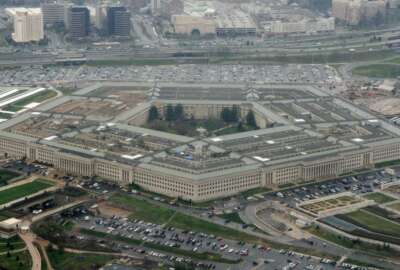Air Force’s quickstart initiative to help bridge work while awaiting funding
The Air Force like many other agencies is awaiting Congressional funding to start new programs, but its quickstart initiative could help it begin with early pha...
Despite budget uncertainty from a lack of permanent funding and a potential government shutdown by Nov. 17, on top of the normally slow budget approval process, the Air Force is trying to be nimble and flexible where possible, said Secretary of the Air Force Frank Kendall.
Kendall said the budget uncertainty and potential shutdown, brings Air and Space Forces’ programs “to a screeching halt.”
“There are about a dozen or more new starts – things that we need Congressional authorization to start,” Kendall said at a CNAS event on Monday. “So not having an authorization bill yet and not having an appropriations bill means we have to wait until those things are passed to begin.”
However, the Air Force has a legislative initiative before Congress, dubbed “quickstart,”which would let it begin early phase, low-cost preliminary work while it waits for Congressional approval.
“I’m hopeful that that’ll be approved this year and give us a little bit more flexibility in [the] future, but right now, under the rules we’re operating under, we can’t start major new programs until we get approval from Congress,” Kendall said. “Under a normal circumstance that takes over a year. If we have a [continuing resolution (CR)] that adds time to that. If we have a yearlong CR, I’m looking at the possibility that my entire tenure in office will be spent waiting for money from Congress. I will have identified in the first few months what we need to do [to] ask Congress for that money and then spend the entire rest of the term waiting for that money to be appropriated.”
Kendall is a big proponent of the quickstart initiative to help the Air Force work quickly, modernize and keep up with competition, particularly from China.
“I’ve been advocating for this for decades because the way our process is set up is we do our planning and then we go through a long deliberation process and then we ask Congress for a budget and then we wait on the order of nine months to a year for them to actually pass the bills and provide the money,” Kendall said. “All of that time is time we’re ceding to China. We’re in a race for military technological superiority; there’s no question about that. And they’re moving forward very quickly … so we need to move quickly and just giving away time that we could use doesn’t make any sense to me.”
He said the quickstart initiative is not aimed at CRs, but rather the normal budget process, which can almost take a year. CRs further delay that timeline. There are also numerous implications for not having permanent funding and instead relying on CRs. For example, the Air Force cannot increase funding for programs it’s ready to ramp up. As a result, for instance, production rates cannot increase and must be kept flat.
“A good example of that is our C3 battle management system, the Advanced Battle Management System, which is the Air Force and Space Forces’ part of Joint All-Domain Command and Control; we intend to double the budget for that effort in ’24,” Kendall said. “We will be kept at half the rate at which we’re prepared to spend if the bills don’t pass or until they pass, so that has a big impact. You can’t hire people. You can’t put contracts in place. And if you do, you have to limit the scope of work to them. In the case of production programs, you can’t do multiple years and you can’t increase production rates in programs where you’d plan to do that. So, it just holds us back. It’s like an anchor keeping us [from] moving forward.”
Kendall said the Air Force has three multi-year weapons requests before Congress. He said these are an important demand signal to industry and can help reduce costs. Meanwhile, the U.S. has been supplying Ukraine and Israel with munitions. Kendall said these were already at lower levels than they should be and have now been further depleted — another example of the importance of increasing production for items the Defense Department and the service branches need.
He compared the impact of a CR to a competitor having a head start in a race.
“If you’re doing a race that’s a mile long, we’re essentially giving away a quarter mile head start to the other side; a quarter mile,” Kendall said. “If you add up over four years, those four periods of three months that we customarily now don’t have appropriations or authorizations, that’s like a quarter of our time. You’re giving away an entire lap in a four-lap race to the other side to move ahead while you’re sitting still. That makes no sense whatsoever.”
While money can be an issue for the Air Force, the problem is not that it does not know what to do with it. The problem is the lack of funding or not appropriately focusing funding.
Kendall said an important element is improving the acquisition process to help put the necessary tools in the hands of warfighters. He said innovation is not an issue for the Air Force, instead it has a money problem. Kendall said programs need to get meaningful capabilities.
“We know what we need to buy, we know where to buy it from, we need the money to buy it,” Kendall said. “That’s really where we are right now. There is a very long list of things that I would love to buy for the Department of the Air Force that I can’t afford to fund. We have a tendency, in the last few years at least, to have started too many projects. We can’t afford them all. We need to be more focused and more disciplined about starting things that we really do intend to take into production and field.”
Copyright © 2024 Federal News Network. All rights reserved. This website is not intended for users located within the European Economic Area.
Kirsten Errick covers the Defense Department for Federal News Network. She previously reported on federal technology for Nextgov on topics ranging from space to the federal tech workforce. She has a Master’s in Journalism from Georgetown University and a B.A. in Communication from Villanova University.
Follow @kerrickWFED






